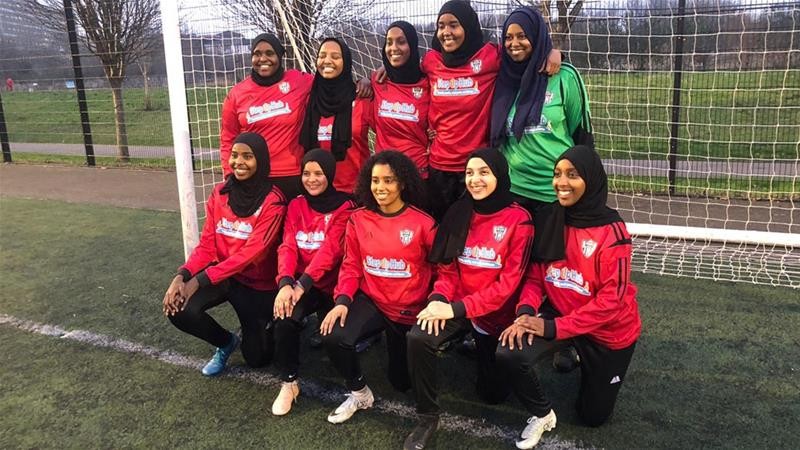
London, England – When Iqra Ismail’s teacher told her that “girls can’t play football”, the then eight-year-old was determined to prove her wrong.
A proud UK-born Somali, Iqra, now 19, grew up in Southall, a multicultural hub in west London.
The youngest of seven, her love affair with football began in primary school.
“Each grade at school had one football team made up of all boys and one girl. I was the second-best girl so would never get in,” she told Al Jazeera.
She was finally included in a squad, putting on a stellar performance in her first game. She turned to the coach and said: “This why you should pick two girls.”
What began as a hobby quickly turned into a passion and despite initial misgivings, Iqra’s mother jumped on board, reminding her daughter to hold on to her religion, values and also focus on her education.
And so aged 14, she joined her first club.
“The club kit was shorts, a t-shirt and long socks. I asked the coach what alternatives there were for me. He said, ‘I don’t know, I’ve never had a Muslim player before.’
“That’s when I realised that as a black, Muslim, hijab-wearing girl, I became the ‘other’.”
Over the years, she continued to try out for teams, but was often rejected.
“As a player, you know when it’s your ability. I don’t think they looked in my direction and said, ‘She’s not good enough,’ I think they didn’t care enough to look because to them I did not belong.
“There’s this narrative that our families will stop us from playing due to religion or culture. The reality is we mainly stop because the focus on education is instilled in you.”
For many, the US is considered the crowning peak of women’s football. At 16, Iqra was about to live her dream, a contract from an American club in her hand.
But two weeks earlier, Donald Trump had won the US election.
Her mother, concerned about rising Islamophobia and racism, advised Iqra against making the move.
“I could not argue with her because she was right, at the same time I was devastated. I stopped playing football completely.
“I did not feel myself at all but I was done. I have a strong faith and thought maybe this is a sign to go a different path.”
While she was busy throwing her energy into studying, her friends convinced her to try out for a club she had been rejected from before. She agreed and this time was signed.
“The experience was a better one, possibly also because the coach was black,” she says.
She soon began her degree in psychology and sociology and joined the University of Portsmouth football team, but at times still felt a sense of not belonging.
In April last year, she gave serious thought to a discussion she had had with two friends, about how they would one day set up their own team for women from ethnic minorities.
She tapped into all her networks and Never Underestimate Resilience, or NUR, was born.
On June 21, the club held its first training session. Four weeks later, 40 women had signed up.
“Finally, there was the safe space for women of colour.”
Around this time, Iqra was presented with an opportunity to captain a team representing Somalia at the Human Rights Cup in Cape Town.
“I’ve always had such a strong sense of Soomaalinimo (Somali nationalism), so to lead the first Somali women’s football team to play an international match was amazing. Half the group was from London, the other from Somalia … everyone’s Somali was tested that day!”

